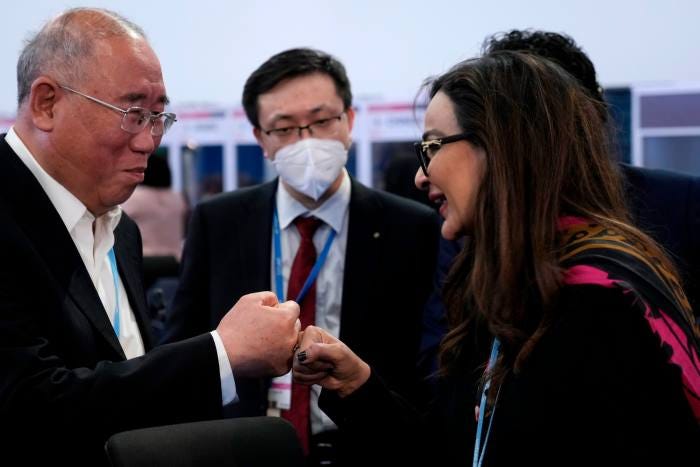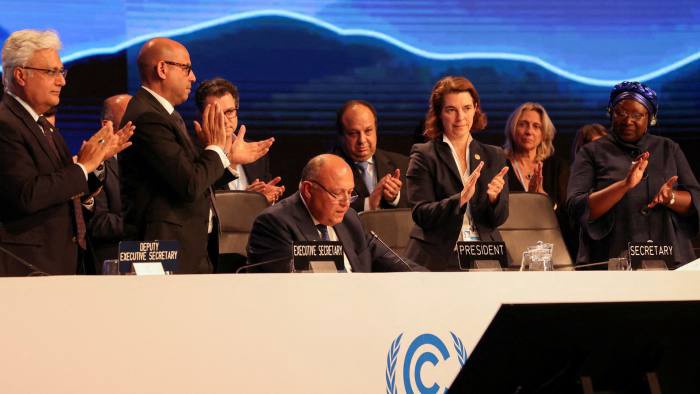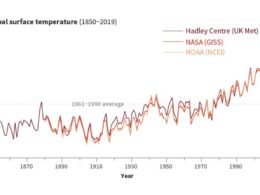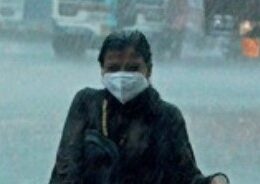Health Transformation Institute (HTI)
Joaquim Cardoso MSc*
Financial Times
November 20, 2022
The UN climate summit has agreed to establish a historic loss and damage fund for poorer countries after working beyond sunrise in Egypt on Sunday, but backed down on greater cuts to greenhouse gas emissions and an end to fossil fuel use.
A breakthrough was achieved with a fund to cover the “loss and damage” that “particularly vulnerable” nations have suffered from climate change, with negotiators agreeing to set up a structure by the next summit in 2023.
A breakthrough was achieved with a fund to cover the “loss and damage” that “particularly vulnerable” nations have suffered from climate change, with negotiators agreeing to set up a structure by the next summit in 2023.
African and other developing world leaders were jubilant about the establishment of a fund to help them cope with the devastating effects of extreme weather caused by climate change.
The contributors and recipients of the money will be determined in the year ahead.
However, in the final hours of the talks, which ran through the night and into the morning of the summit’s second day of overtime, countries could not agree on provisions that would accelerate emissions cuts.
A push to include the phaseout of all fossil fuels in the final agreement also failed.
However, in the final hours of the talks, which ran through the night and into the morning of the summit’s second day of overtime, countries could not agree on provisions that would accelerate emissions cuts.
A push to include the phaseout of all fossil fuels in the final agreement also failed.
EU climate chief Frans Timmermans reflected deep dissatisfaction with the outcome in his strident address to the closing session, saying the result was “not enough of a step forward for people and planet”.
“We should have done much more. Our citizens expect us to lead. That means far more rapidly reduced emissions,” he said.
The EU had signed up to the deal “reluctantly” and was disappointed that it had to give up on its position “to allow the process to move forward”.
the result was “not enough of a step forward for people and planet”. “We should have done much more. Our citizens expect us to lead. That means far more rapidly reduced emissions,” — EU climate chief Frans Timmermans –
Addressing the role of the oil- and gas-producing countries, led by Saudi Arabia, in protecting production of fossil fuels, Timmermans said, “Too many parties are not ready to make more progress today in the fight against climate change.”
Addressing the role of the oil- and gas-producing countries, led by Saudi Arabia, in protecting production of fossil fuels, Timmermans said, “Too many parties are not ready to make more progress today in the fight against climate change.”
The EU had made a dramatic threat to walk out on Saturday if global warming targets were not enough to “keep 1.5 alive” — a phrase that became the mantra of last year’s COP26 talks and refers to the 2015 Paris Agreement to keep global warming well below 2C, ideally 1.5C, from pre-industrial times by cutting greenhouse gas emissions.
The EU had made a dramatic threat to walk out on Saturday if global warming targets were not enough to “keep 1.5 alive”

UK climate chief Alok Sharma, the president of COP26 in Glasgow, reflected exasperation over the failure to improve the effort to cut emissions.
“It is very much on life support — 1.5c,” he said.
“We had to fight incredibly hard, relentlessly — it was like a battle — to make sure that we preserved what we got over the line in Glasgow. I’m incredibly disappointed that we weren’t able to go further.”
“It is very much on life support — 1.5c,”
“We had to fight incredibly hard, relentlessly — it was like a battle — to make sure that we preserved what we got over the line in Glasgow. I’m incredibly disappointed that we weren’t able to go further.”
UN secretary-general António Guterres praised the set-up of a fund for climate damage but also voiced his discontent with failure on global warming targets.
“Our planet is still in the emergency room. We need to drastically reduce emissions now — and this is an issue this COP did not address,” he said.
“Our planet is still in the emergency room. We need to drastically reduce emissions now — and this is an issue this COP did not address,” he said.
“A fund for loss and damage is essential — but it’s not an answer if the climate crisis washes a small island state off the map — or turns an entire African country to desert,” Gueterres added.
“A fund for loss and damage is essential — but it’s not an answer if the climate crisis washes a small island state off the map — or turns an entire African country to desert,” Gueterres added.
Originally published at https://www.ft.com on November 20, 2022.
Names mentioned:
EU climate chief Frans Timmermans
UK climate chief Alok Sharma, the president of COP26 in Glasgow,
UN secretary-general António Guterres
Note from the editor:
The conference had been driven by two overriding themes — justice and ambition — and highlighted decisions made on those fronts:
Finally making good on the long-delayed promise of $100 billion a year in climate finance for developing countries; clarity and a credible roadmap to double adaptation finance; and changing the business models of multilateral development banks and international financial institutions; among others.
As compared to past COP decisions focused on the so far unsuccessful efforts to create a mitigation fund of just $100 billion, this year’s text highlights: “that about USD 4 trillion per year needs to be invested in renewable energy up until 2030 to be able to reach net zero emissions by 2050, that, furthermore, a global transformation to a low-carbon economy is expected to require investment of at least USD 4–6 trillion per year.












